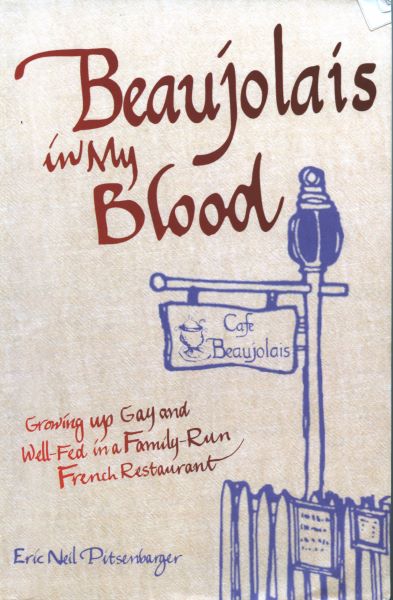 Returning to Mendocino this May to share my newly published memoir—Beaujolais in My Blood: Growing up Gay and Well-Fed in a Family-Run Restaurant—will be a thrilling and sweet homecoming. I’m bringing the story of my adolescence living in the small Victorian village above Café Beaujolais, where my parents, Ellen and Gerald Pitsenbarger, created a small French restaurant. The cafe evolved into a famous local institution and their efforts gave me a great story to tell.
Returning to Mendocino this May to share my newly published memoir—Beaujolais in My Blood: Growing up Gay and Well-Fed in a Family-Run Restaurant—will be a thrilling and sweet homecoming. I’m bringing the story of my adolescence living in the small Victorian village above Café Beaujolais, where my parents, Ellen and Gerald Pitsenbarger, created a small French restaurant. The cafe evolved into a famous local institution and their efforts gave me a great story to tell.
To a city kid, sleepy little Mendocino in the early 1970’s felt almost like a ghost town; at 14, I was faced with the existential challenge of finding myself in a place where time seemed to have stood still.
My parents would be proud of how their endeavor has evolved into a fine dining experience, with much of the original caché still remaining. Mendocino and Café Beaujolais are now joined in the minds of gourmets, with a farm-to-table rustic charm and commitment to a right livelihood. Ellen and Gerald Pitsenbarger helped to begin a movement. In writing this book, I wanted to give them credit and send them a love letter.
My early involvement in work at the restaurant lends elements of dark comedy to this memoir, but, as can be seen in the excerpt below, there was always serious work to do. I will present some of my experiences—with an interactive slideshow, short reading, and Q+A—at the Kelley House Museum Thursday, May 18th, from 4:00 PM–5:30 PM. Local author Eleanor Clooney will be on hand to ask me questions and facilitate the discussion.
Chapter 15. Glazed Perfection
I was addicted to bread. I’d become a breadaholic, and my mother, Ellen, was unwittingly responsible. She enabled me in my craving by making the very best bread I’d ever tasted: light years beyond Wonder-bread, even better than the famed sourdough from Fisherman’s Wharf in San Francisco.
For the café, she baked hundreds of perfect little loaves, at least thirty a day. You could build a house from all the bread that came out of that oven. Ellen was a one-woman factory, always tired and complaining of sore arms as she muscled big bowls of dough, kneading by hand, grappling with hunks, stretching, pulling, and pounding.
Each diner’s table would get its own individual fresh warm loaf of bread wrapped in a cloth napkin, presented on a little board along with a cute round of unsalted sweet butter molded with a thistle design. It was the first act once customers had ordered and were settling in, and when we brought it to the table, people would clap hands together or squeal with delight. It was like getting a birthday surprise.
Ellen was always working and slept fitfully. She started alone early every morning, when the first rays of the sun crisscrossed the kitchen to illuminate her makeshift baking pantry. She hovered like a shaman ensconced in her sanctum, surrounded by ceremonial tools, with bunches of dried herbs, every baking utensil, mixing spoon, ladle, found and repurposed stick or spatula hanging on hooks, sprouting from jars, or doing double duty as bookmarks. Her mixing bowl ready, the cutting board clean, the family of bread pans oiled, lined up and ready, she would gather herself together and begin the day-long bread baking, lasting until the Café closed at 10:00, four days a week. Even from Sunday to Tuesday, our three days off, there was always plenty for us to do, something that had been put off or an improvement project.
The Kelley House Museum is open from 11AM to 3PM Thursday through Monday. If you have a question for the curator, reach out to curator@kelleyhousemuseum.org to make an appointment. Walking tours of the historic district depart from the Kelley House regularly.